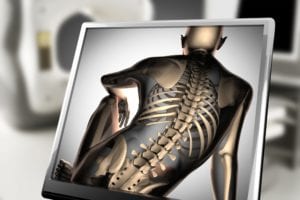Written by Chrystal Moulton, Staff Writer. Quantitative ultrasound results showed that individuals on the vegan diet had lower ultrasound attenuation scores (BUA) compared with omnivores (P = 0.02).
 Although the vegan diet is protective against various chronic diseases 1-3, it is also associated with low bone mineral density 4. Understanding the effect of the vegan diet on biomarkers of bone metabolism is important to understanding what nutrients are needed and what elements related to bone health are affected. In this cross-sectional study, researchers investigated the difference in bone health between omnivores and vegans using quantitative ultrasound (QUS) 5. They also measured the difference between nutritional and bone biomarkers between individuals following a vegan or omnivorous diet.
Although the vegan diet is protective against various chronic diseases 1-3, it is also associated with low bone mineral density 4. Understanding the effect of the vegan diet on biomarkers of bone metabolism is important to understanding what nutrients are needed and what elements related to bone health are affected. In this cross-sectional study, researchers investigated the difference in bone health between omnivores and vegans using quantitative ultrasound (QUS) 5. They also measured the difference between nutritional and bone biomarkers between individuals following a vegan or omnivorous diet.
One hundred and sixty-one individuals were recruited for this study. Participants were included if they followed their diet (vegan or omnivorous) for at least one year and were between the age of 30 and 60 years old. The vegan diet defined as consumption of no animal products indicated that participants who were vegan did not consume cheese, milk, eggs, or any animal by-products or meat. The omnivorous diet was defined as consumption of two portions of meat and processed meat per week or at least three portions of meat per week. Participants visited the center for testing twice. Their first visit consisted of 24-hour urine collection, instructions, an informed consent, and documentation of their diet using three days weighed food protocol. At their second visit quantitative ultrasound and anthropometric measurements were taken along with fasting blood sample and lifestyle assessment. A total of 36 vegans and 36 omnivores matched for age and sex comprised the final study population. Quantitative ultrasound was used to measure bone mineral density by measuring broadband ultrasound attenuation (BUA, dB/ MHz) and the speed of sound (SOS, m/s). An index referred to as the stiffness index was automatically calculated from the broadband ultrasonic attenuation (BUA) and speed of sound measurements (SOS). Exploratory reduced rank regression assessment was done to determine any combination of nutritional or bone biomarkers that contribute to bone health. Lifestyle characteristics were captured via computer-based questionnaires.
Results from the trial indicated no differences in anthropometric measurements, smoking, alcohol consumption, physical activity, or education between the two groups (P> 0.05). Quantitative ultrasound results showed that individuals on the vegan diet had lower ultrasound attenuation scores (BUA) compared with participants on the omnivorous diet (P = 0.02). In biomarkers of bone health, the participants who were vegan had a higher bone turnover rate indicated by higher CTX (P = 0.03) and alpha-Klotho (P= 0.01) measurements. Vegans also had lower urinary calcium (P= 0.004) and urinary iodine levels (P <0.0001). See Table 1 for selected results from this investigation.
Table 1. Bone biomarkers & parameters in participants following vegan versus omnivorous diet
| Parameters | Omnivores | Vegans | p-value |
|---|---|---|---|
| BUA (dB/MHZ) | 118 ± 10.8 | 111.8 ± 10.7 | 0.02 |
| CTX (ng/mL) | 0.36 ± 0.16 | 0.45 ± 0.19 | 0.03 |
| α-Klotho (pg/mL) | 640.1 | 780.3 | 0.01 |
| Lysine (µmol/L) | 171.4 | 128.5 | <0.0001 |
| Urinary Iodine (µg/L) | 74.1 | 28.1 | <0.0001 |
| Urinary Ca+ (mg/L) | 86 | 55.5 | 0.004 |
Exploratory reduced rank regression testing indicated 12 out of 28 biomarkers contributed most to bone health. Based on factor loading score (-0.2 ≥ x ≥ 0.2) in reduced rank regression testing, alpha-klotho, selenoprotein P, thyroid stimulating hormone, lysine, leucine, fibroblast growth factor 23, urinary calcium, magnesium, and iodine, along with vitamins A and B6 were all indicated as main contributors to bone health.
Overall individuals following a vegan diet had lower bone density and lower levels of key minerals, amino acids that affect bone health. Key biomarkers related to bone health are also affected by the vegan diet. Additional studies will be needed to confirm these findings.
Source: Menzel, Juliane, Klaus Abraham, Gabriele I. Stangl, Per Magne Ueland, Rima Obeid, Matthias B. Schulze, Isabelle Herter-Aeberli, Tanja Schwerdtle, and Cornelia Weikert. “Vegan Diet and Bone Health—Results from the Cross-Sectional RBVD Study.” Nutrients 13, no. 2 (2021): 685.
© 2021 by the authors. Licensee MDPI, Basel, Switzerland. This article is an open access article distributed under the terms and conditions of the Creative Commons Attribution (CC BY) license (https:// creativecommons.org/licenses/by/ 4.0/).
Click here to read the full text study.
Posted June 17, 2021.
Chrystal Moulton BA, PMP, is a 2008 graduate of the University of Illinois at Chicago. She graduated with a bachelor’s in psychology with a focus on premedical studies and is a licensed project manager. She currently resides in Indianapolis, IN.
References:
- Lee Y, Park K. Adherence to a Vegetarian Diet and Diabetes Risk: A Systematic Review and Meta-Analysis of Observational Studies. Nutrients. 2017;9(6).
- Kahleova H, Levin S, Barnard ND. Vegetarian Dietary Patterns and Cardiovascular Disease. Progress in cardiovascular diseases. 2018;61(1):54-61.
- Dinu M, Abbate R, Gensini GF, Casini A, Sofi F. Vegetarian, vegan diets and multiple health outcomes: A systematic review with meta-analysis of observational studies. Crit Rev Food Sci Nutr. 2017;57(17):3640-3649.
- Iguacel I, Miguel-Berges ML, Gómez-Bruton A, Moreno LA, Julián C. Veganism, vegetarianism, bone mineral density, and fracture risk: a systematic review and meta-analysis. Nutr Rev. 2019;77(1):1-18.
- Menzel J, Abraham K, Stangl GI, et al. Vegan Diet and Bone Health-Results from the Cross-Sectional RBVD Study. Nutrients. 2021;13(2).
